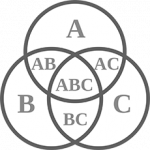The Center for 21st Century Studies (C21) mission is to build a community of scholars addressing the most pressing questions of our time. We support and foster research by bringing emerging and established researchers across a range of disciplines together for collaborative idea generation and individual reflection.
The Center has several initiatives that foster interdisciplinary research, with a strong centering in the humanities.
Process
C21 created a model to bring intentionality to the design, planning, and execution of what the Center calls the “Collaborative Knowledge Creation (CKC)” process. Community and university stakeholders take part in every step of it, which informs the creation of accessible programming that provides multiple points of access and honors multiple ways of knowing.
Themes
C21 has a long tradition of selecting an annual theme to guide its programming and the collaborations of its Fellows. This single theme culminated in an annual spring conference, and often the publication of a monograph of the conference proceedings. See this archive of past conference themes.
Interest Clusters
To better foster interdisciplinary partnerships for research, teaching, and social change initiatives, C21 is hosting Interest Clusters. Based on a survey sent to C21 stakeholders across disciplines, we identified the seven general themes listed in the sidebar – three topics and four methods/practices.
Fellowships
Each year the Center selects a cohort of 5 Fellows. These can be drawn from Faculty, Staff, and – new in 2021 – Community-based project partners. Fellows are selected for the excellence of their proposals for projects addressing one of the C21 themes. Humanities-oriented projects from any field are given priority.
New calls for Fellows are commonly posted November 1st and selected for the following academic year. Fellows receive an office on the 9th Floor of Curtin Hall and are expected to meet bi-weekly to support the development of each other’s research.
Collaboratories

With additional funding provided by the College of Letters & Science, C21 supports research projects through an annual call for collaborations among faculty, graduate students, academic staff, and community members. Collaborative groups are required to include researchers from more than one unit (i.e., department, division, or college). Potential participants could also be drawn from other local universities, community organizations, or from members of the Milwaukee-area public. Projects can focus on the creation of sustainable research networks; curricular offerings; grant proposals; conferences and lectures.
In 2021, Collaboratory grant proposals will be invited for two or three-year timelines to better foster long-range development.
Partners
Collaborative research is only possible through strong partnerships. C21 has partnered with various organizations, groups, and people on and off campus, around Milwaukee, and across the state, country, and world. Partners include external funders of project-based research, campus investigators (students, faculty, staff), community leaders, and program participants.
Stakeholders
In building a community of scholars, C21 is part of a much larger network of stakeholders connected specifically to UWM and Milwaukee County. Faculty and staff experts across UWM groups, C21 Collaboratories, and the Story Experience Program work closely with community organizations in the framing and expression of research.
Funded Research
In addition to providing administrative support to Center Fellows in identifying and applying for research grants each year, the Center for 21st Century Studies has participated in numerous grant-funded and award-based research projects over its 50-year history. Below are some recent funded research projects in which C21 was involved.